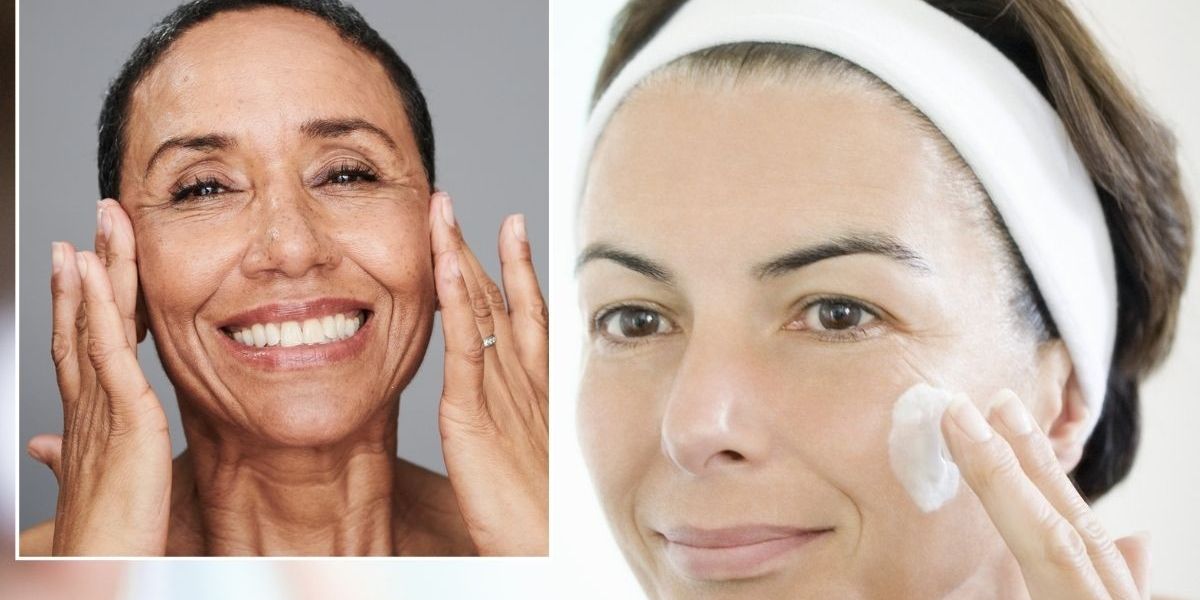While ageing is a gift, it is undeniable that many women want to look younger than their years.
There are so many ways to go about this, from instant anti-ageing makeup fixes to shampooing techniques that will give you the best hair of your life.
GB News spoke exclusively to a plastic surgeon and a dietician about how women can look “10 years younger”.
Board-certified plastic surgeon from The Aesthetics Centers, Dr Siamak Agha, claimed that ladies can drop a decade without going under the knife.
Sunscreen is ‘absolutely essential’ as ‘UV damage is a major culprit in premature ageing’
GETTY IMAGES
Offering his sage advice to anti-ageing enthusiasts, he suggested that easy lifestyle changes can help a woman look “10 years younger” than their age and even “delay the onset of ageing”. One of his top tips was to wear a daily SPF to combat UV damage.
Speaking about the ideal skin care regime for younger, glowing skin, Dr Agha stressed the importance of using hydrating, skin-boosting products.
He said: “Ingredients like hyaluronic acid, ceramides and peptides help maintain skin integrity.”
The expert added that sunscreen is “absolutely essential”. Although many people skip the SPF when it’s not sunny outside, this core product should be used every single day, as “UV damage is a major culprit in premature ageing”.
The plastic surgeon also advised women to invest in retinol to look 10 years younger. Retinol is “proven to stimulate cell turnover and collagen production, improving skin texture and firmness over time”.
For those keen to go down the supplement route to enhance their complexion, the expert pointed to collagen supplements.
He said: “Evidence is mixed but hydrolysed collagen peptides combined with vitamin C may contribute to skin resilience.”
Making some simple lifestyle changes could also be very helpful in the pursuit of youth, the expert added.
He advised women to stop smoking cigarettes and avoid excess alcohol consumption as “both accelerate skin ageing”. They can also try facial massages or targeted exercises that “stimulate circulation and muscle tone”.
Maintaining a stable weight is also advisable to “prevent the unnecessary stretching of the skin”.
Finally, stop lying on your front or side when you go to sleep. The expert explained that sleeping on your back is best because this “reduces gravitational stress on the face”.
For those keen to enlist the help of professionals, Dr Agha named a variety of treatments.
- Exosome Therapy: Using stem cell-derived exosomes to stimulate powerful skin regeneration
- Injectable PLLA or CaHA with RF Microneedling: A hybrid approach targeting both volume loss and skin tightening
- Thread Lifts with Biostimulatory Fillers: PDO threads combined with Sculptra for lift and collagen stimulation
- Regenerative Medicine (PRF, Growth Factors, Peptide Therapy): Harnessing advanced biomolecules for long-term skin improvement
GB News also spoke to a registered dietician about how women can knock 10 years off their appearance.
Trista Best from Balance One Supplements stated: “Relying on processed convenience foods – even those that are considered healthy – as a main source of nutrition can be damaging to your health and cause you to age more rapidly.
LATEST DEVELOPMENTS
For younger-looking skin, integrate antioxidant-rich foods like fruits and vegetables into your diet
GETTY IMAGES
“They are made with refined carbohydrates and sugar and can speed up the ageing process.
“There are two primary causes of accelerated ageing that appear on the skin: excessive unprotected sun exposure and advanced glycation end products (AGEs). AGEs form as a result of sugar combined with fat or protein.
“This describes most processed convenience foods like crisps, baked goods and ice cream to name a few. These products increase ageing and also lead to poor gut health. Both of these side effects are damaging to your overall health.”
An article entitled ‘Advanced Glycation End Products in Foods and a Practical Guide to Their Reduction in the Diet’, published in the National Library of Medicine, confirmed that dietary AGEs “contribute to increased oxidant stress and inflammation”.
A second article entitled ‘Advanced Glycation End Products in the Skin: Molecular Mechanisms, Methods of Measurement, and Inhibitory Pathways’, published in the same biomedical library, read: “Comprehensive studies have shown that AGEs not only reduce skin elasticity, accumulate pigments and produce appearance changes such as wrinkles, but also destroy the skin barrier, cause the apoptosis of skin-related cells and induce inflammation.
“As AGEs accumulate year-by-year, the skin undergoes profound changes from the inside to the outside.”
The solution? According to Trista, your best bet is to limit foods high in AGEs, only eating them when “absolutely necessary”.
For younger-looking skin, women should integrate more whole foods and antioxidant-rich foods such as fruit and vegetables, which “decrease oxidative damage internally and externally”.
Before making radical changes to your skin care regime, lifestyle or diet, ensure you consult your GP who can give you tailored advice.
If you are looking into anti-ageing treatments or cosmetic procedures – both non-surgical and surgical – it is essential that you do your research beforehand. Any procedure must be administered by a professional. The NHS has detailed guidance on this.
In a recent GB News deep dive, an expert shared the “ideal” morning and evening regime for “the best skin of your life” over 50.
